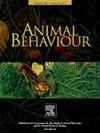Differential impact of artificial light at night on cognitive flexibility in visual and spatial reversal learning tasks
IF 2.3
2区 生物学
Q2 BEHAVIORAL SCIENCES
引用次数: 0
Abstract
Artificial light at night (ALAN) is a pervasive environmental pollutant with multiple adverse effects on animal biology. As the vertebrate nervous system is particularly sensitive to light effects, this study explores the potential negative impact of ALAN on cognition in adult zebrafish, Danio rerio. Fish from mesocosm populations exposed to either ALAN or control conditions underwent visual and spatial learning tasks, along with an evaluation of cognitive flexibility with visual and spatial reversal learning tasks. Contrary to our initial prediction of a general negative impact, learning performance was not affected by the ALAN treatment. The analysis of reversal learning revealed task-dependent effects on cognitive flexibility: fish exposed to ALAN performed worse than control fish in the visual reversal learning task, but displayed better performance in the spatial reversal learning task. We propose that the influence of ALAN on cognition might differ between different cognitive functions or involve noncognitive factors that play different roles in the testing paradigms. The study underscores the importance of task specificity in nonadaptive cognitive plasticity and calls for ecological assessments to quantify fitness consequences of ALAN in natural settings.
夜间人造光对视觉和空间反转学习任务中认知灵活性的不同影响
夜间人造光(ALAN)是一种普遍存在的环境污染物,对动物生物学有多种不利影响。由于脊椎动物的神经系统对光的影响特别敏感,本研究探讨了 ALAN 对成年斑马鱼(Danio rerio)认知能力的潜在负面影响。来自暴露于 ALAN 或对照条件下的中观宇宙种群的鱼类接受了视觉和空间学习任务,并通过视觉和空间反转学习任务评估了认知灵活性。与我们最初预测的普遍负面影响相反,学习成绩并未受到 ALAN 处理的影响。对逆转学习的分析表明,认知灵活性受到任务的影响:暴露于ALAN的鱼在视觉逆转学习任务中的表现比对照组鱼差,但在空间逆转学习任务中的表现更好。我们认为,ALAN 对认知的影响可能因不同的认知功能而异,或者涉及在测试范式中发挥不同作用的非认知因素。这项研究强调了任务特异性在非适应性认知可塑性中的重要性,并呼吁进行生态评估,以量化ALAN在自然环境中对体能的影响。
本文章由计算机程序翻译,如有差异,请以英文原文为准。
求助全文
约1分钟内获得全文
求助全文
来源期刊

Animal Behaviour
生物-动物学
CiteScore
4.60
自引率
8.00%
发文量
236
审稿时长
10.2 weeks
期刊介绍:
Growing interest in behavioural biology and the international reputation of Animal Behaviour prompted an expansion to monthly publication in 1989. Animal Behaviour continues to be the journal of choice for biologists, ethologists, psychologists, physiologists, and veterinarians with an interest in the subject.
 求助内容:
求助内容: 应助结果提醒方式:
应助结果提醒方式:


